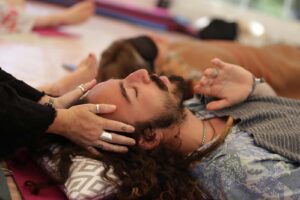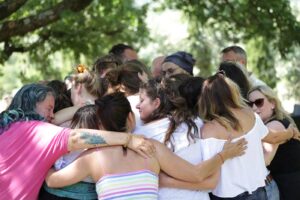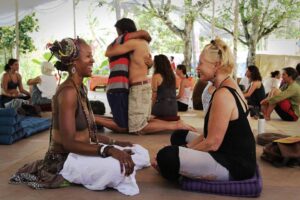Have you ever had the feeling that you are a victim? Or have you ever tried to help someone only to be told you’ve hurt him or her instead? Are you feeling underappreciated, unheard or fed up? Are you feeling like being in a situation is taking away much more than it’s giving back? Or perhaps you feel a raise in adrenaline, an increased heartbeat, the urgent need to interrupt?
Karpman’s Drama Triangle is a handy way to observe the most fundamental dynamics that lie under the relating process. It’s not called the Drama Triangle for nothing. In fact, when you feel a tension between you and another person its likely that you are on the edge – if not already in the middle of the triangle.
Once you aware of it and how it works you will start to notice that many people are living in the triangle and how many triangles there are! With friends, relatives or at work the invitations to step in are many, and often too obscure to notice. Our mind closes off to the subtle messages because our perception has been hardened in so any ways. TV, the movies and novels are most successful when there is conflict. Conflict gets out attention. Drama sucks us out of our state and into the action where we feel more fulfilled.
We have learned to believe that a high adrenalin level means we are more alive, but we have not properly connected to the consequences – adrenal fatigue and a compromised immune system. This magic hormone gives us enormous power for the times that we need it. In an emergency, we are suddenly endowed with enormous strength as the adrenalin courses through us and enables us to do extraordinary things.
Yet the supply is finite, Compared to two hundred years ago in we use it up much more quickly. A child learns to ‘live on the edge’ as soon as he can hold an electronic game in his hands, and I fear that we have some nasty surprises coming in the next half century as we see the consequences of squandering such a precious resource. We are addicted to the surge, and the more we follow our temptation the less aware we become to something else. The alternative is what we are able to dis-cover in the comparative silence and stillness when our adrenalin is not rising – in the gap. The alternative to adrenalin-induced decisions is more considered, subtle and sensitive.
You may notice the hidden ‘story’ underneath the adrenalin-fueled reality that most people are happy to live, how they feed each others need to stay there, and how incapable they become to simply step out of the ‘story’ they tell themselves to stay engaged in the fray.
I used to be the Hero. Because of a fundamental core belief that I was not good enough I developed the Hero persona to prove that not only was I worthy of existence, but that I could help others – especially those… those victims that needed me. In fact, so as to maintain my constructed Hero persona, I needed victims – and villains too! Little did I know that I had unconsciously committed to manifesting them in my life, misguidedly thinking that I was fulfilling a purpose. As I attracted them unconsciously, I fooled myself that I was valiant, honorable and worthy. It became my cause, and I honed my attention for the next chance to prove my worth! Yes, the world could not manage without me.
Truth is I became a ‘meddler’, all the time thinking I was helping. This became particularly evident at work, where I inserted myself in my employees’ day without any real sensitivity to their situation. My need to help interfered with my awareness of whether help was needed. My micro-managing tendencies didn’t do much good either, and I soon became the…villain.
People avoided me, steered away when they saw me coming. They stopped returning my calls, and vanished with heir friends during the lunch break. After all my efforts to be likeable, helpful and kind I had gone full circle, and reaffirmed that core belief again – I had failed, I wasn’t worthy. Now I had become… the victim.
But what better way out of victim hood than to find someone else that’s worse off than you, right? After all there’s much to be grateful about, so many less fortunate than myself! Therefore, I’d struggle back into my Hero mantle, and begin the whole cycle one more time.
In Seeds of Alchemy, the Foundation course for The Training, we do simple role-play exercises that are light-hearted and fun as we act out each role; the Hero, the Villain and the Victim.
Every time I get emails afterwards from students as they notice how many relationships are played out in the Triangle.
So what can we do? How can we get our hands back on the wheel? What can you ask yourself that will empower you to step out of someone else’s Drama Triangle?
N.B. Please note this article does not disregard that there are true victims in life, but is intended to distinguish between what is true and what is not. In fact, I assume we have all been victims at some point in our lives, and a fundamental part of the Alchemy of Breath Training is to re-visit such a moment, this time equipped with the tools we need to attend to our subconscious as our own healer. This is fundamental to our release, and our chance to grow beyond the limitations that trauma may have placed upon us.






